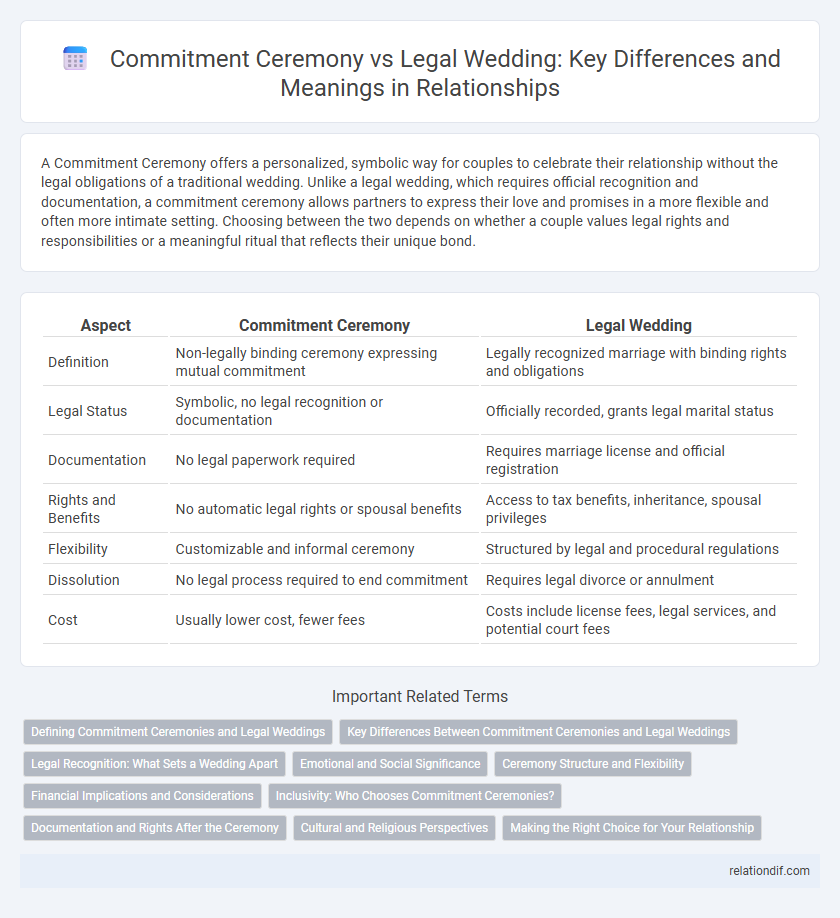A Commitment Ceremony offers a personalized, symbolic way for couples to celebrate their relationship without the legal obligations of a traditional wedding. Unlike a legal wedding, which requires official recognition and documentation, a commitment ceremony allows partners to express their love and promises in a more flexible and often more intimate setting. Choosing between the two depends on whether a couple values legal rights and responsibilities or a meaningful ritual that reflects their unique bond.
Table of Comparison
| Aspect | Commitment Ceremony | Legal Wedding |
|---|---|---|
| Definition | Non-legally binding ceremony expressing mutual commitment | Legally recognized marriage with binding rights and obligations |
| Legal Status | Symbolic, no legal recognition or documentation | Officially recorded, grants legal marital status |
| Documentation | No legal paperwork required | Requires marriage license and official registration |
| Rights and Benefits | No automatic legal rights or spousal benefits | Access to tax benefits, inheritance, spousal privileges |
| Flexibility | Customizable and informal ceremony | Structured by legal and procedural regulations |
| Dissolution | No legal process required to end commitment | Requires legal divorce or annulment |
| Cost | Usually lower cost, fewer fees | Costs include license fees, legal services, and potential court fees |
Defining Commitment Ceremonies and Legal Weddings
Commitment ceremonies symbolize personal promises without legal recognition, focusing on emotional and spiritual bonds between partners. Legal weddings, in contrast, involve formal procedures recognized by the state, granting couples legal rights and responsibilities. While commitment ceremonies emphasize individualized expression, legal weddings provide binding contracts that affect marital status, property, and inheritance.
Key Differences Between Commitment Ceremonies and Legal Weddings
Commitment ceremonies symbolize a couple's dedication without legal recognition, often personalized to reflect unique values and beliefs, while legal weddings involve official licensing and registration recognized by government authorities, granting spousal rights and responsibilities. Legal weddings require compliance with jurisdictional laws, including obtaining a marriage license and sometimes witnesses, whereas commitment ceremonies have no legal prerequisites or binding effects. The distinction impacts benefits such as tax filing, inheritance rights, and healthcare decision-making, which are typically accessible only through legal marriage.
Legal Recognition: What Sets a Wedding Apart
A legal wedding provides formal recognition by government authorities, granting parties official rights and responsibilities such as inheritance, tax benefits, and spousal privileges. Commitment ceremonies, while symbolically meaningful, lack this legal status and do not confer the same binding obligations or protections under the law. This legal recognition distinguishes weddings as both a personal and institutional contract, ensuring enforceability and societal acknowledgment.
Emotional and Social Significance
A Commitment Ceremony emphasizes the emotional bond and personal vows shared between partners, often reflecting their unique values and relationship without legal constraints. It serves as a powerful social statement within communities that may not recognize legal marriage, fostering acceptance and connection among family and friends. In contrast, a Legal Wedding carries formal recognition from the state, granting specific rights and responsibilities, but may lack the deeply personalized and symbolic elements central to many commitment ceremonies.
Ceremony Structure and Flexibility
A commitment ceremony offers a highly flexible structure tailored to the couple's personal beliefs and preferences, allowing for unique rituals and customized vows without legal constraints. In contrast, a legal wedding follows a more standardized format dictated by local laws, requiring official documentation, licensed officiants, and adherence to prescribed procedures. This legal framework ensures formal recognition but limits the ceremony's adaptability compared to the personalized and symbolic nature of commitment ceremonies.
Financial Implications and Considerations
Commitment ceremonies often lack the legal recognition that provides spouses with automatic financial protections, such as tax benefits, inheritance rights, and spousal Social Security benefits, which are secured in legal weddings. Couples in commitment ceremonies must create additional legal documents like wills, powers of attorney, and healthcare directives to ensure financial security and decision-making authority. Legal weddings also simplify joint ownership of assets and debts, offering clearer financial responsibilities and protections compared to commitment ceremonies.
Inclusivity: Who Chooses Commitment Ceremonies?
Commitment ceremonies are often chosen by couples seeking an inclusive celebration that embraces diverse cultural, religious, or personal beliefs without legal constraints. These ceremonies provide a flexible platform for LGBTQ+ couples, interfaith partners, or those wishing to affirm their bond in a non-traditional way. Unlike legal weddings, commitment ceremonies prioritize personal expression and community acknowledgment over formal legal recognition.
Documentation and Rights After the Ceremony
A Commitment Ceremony symbolizes a personal pledge between partners without legal recognition or government-issued documentation, leaving participants without automatic spousal rights such as inheritance, tax benefits, or decision-making authority in emergencies. In contrast, a Legal Wedding provides official documentation like marriage certificates, granting couples legally enforceable rights including property ownership, spousal benefits, and parental rights. Couples seeking legal protections should prioritize a Legal Wedding to ensure their rights are upheld by law post-ceremony.
Cultural and Religious Perspectives
Commitment ceremonies often hold deep cultural and spiritual significance, reflecting personal or communal values without legal obligations, while legal weddings formalize marital status through state-recognized documentation. Many religious traditions may embrace commitment ceremonies as meaningful rites, yet reserve legal weddings for canonical recognition and sacramental purposes. Differences in these practices highlight the interplay between cultural identity, religious beliefs, and legal frameworks in defining marital commitment.
Making the Right Choice for Your Relationship
A commitment ceremony offers a personalized and meaningful way to celebrate your bond without the legal obligations of a wedding, ideal for couples prioritizing emotional significance over formal recognition. Legal weddings provide official status, including rights and benefits such as tax advantages, inheritance, and decision-making authority in medical situations. Choosing between the two depends on your relationship goals, values, and the importance you place on legal protections versus symbolic expression.
Commitment Ceremony vs Legal Wedding Infographic

 relationdif.com
relationdif.com